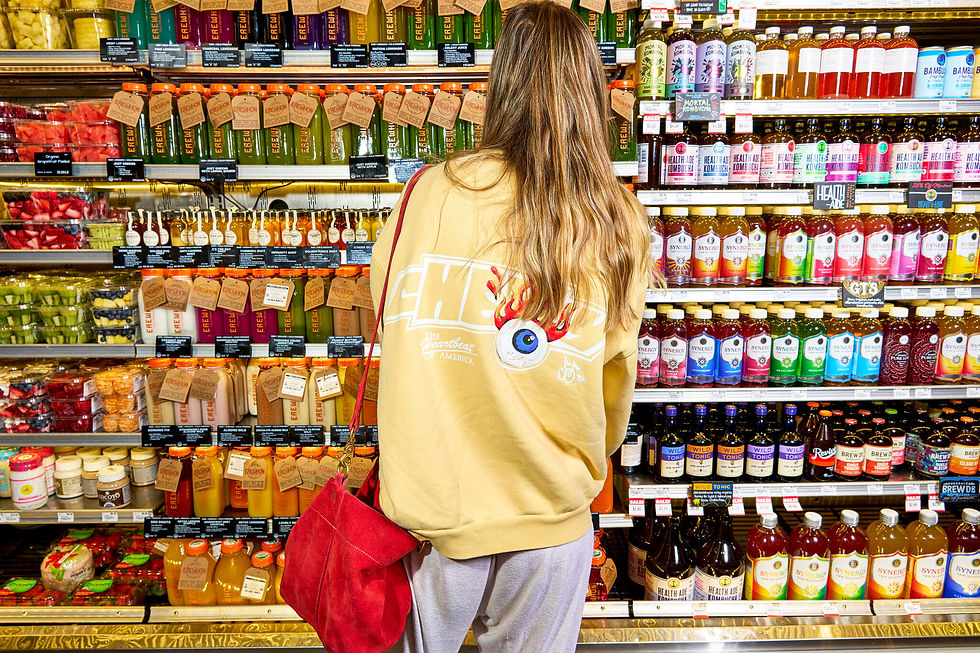Food as a Luxury: A Critical Examination
- Lauren Groce

- Sep 8, 2024
- 4 min read

The 2010’s saw a surge of vlogs, or video blogs, of YouTubers with abhorrent amounts of money visiting restaurants and ordering the most expensive item on the menu as a form of content. Ordering pizza stuffed with caviar with shaved truffles, garnished with dazzling gold leaf being one of the most unnecessary buys. In recent years, the notion of food as a luxury has gained traction, particularly in affluent societies where the distinction between sustenance and indulgence has blurred. As dining experiences and content creation evolve, the concept of food surpasses its foundation as nourishment, becoming a symbol of status and exclusivity. However, this shift raises critical questions about the implications for societal values, equity, and the fundamental purpose of food.
Grocery Glamorization

In today's consumer culture, dominated by Gen-Z and Millenials, dining out at exclusive restaurants or savoring food as a spectacle often signifies a status statement. A creator on TikTok who amassed 17 million followers for so-called lifestyle content with the tag @alixearle recently did a “Grocery Haul.” While for the average person, a grocery haul would be mundane and inexplicably boring, this creator’s haul originates from Erewhon, a natural foods grocery store. She smiles and shows off to the camera her smoothies of every color, starting at $19.00 each.
These all-natural, organic, and trendy grocery stores, while can be helpful in encouraging young people to eat healthier, are ultimately unrealistic for the average American to indulge in. Although, there is an interesting point in that no grocery store should be seen as indulgent. It is obvious the food and grocery industry is the next victim of maximalist culture where more is more, and nothing feels better than something straight off the shelf.
While the naked eye can tell how unheard of it is for finding luxury in your local grocery store, it is more harmful than what appears at face value.

Economic and Social Implications
The elevation of food to a luxury status has significant economic and social repercussions. The emphasis on exclusivity and high price tags often comes at the expense of equitable access to nutritious food. In many regions, particularly in low-income communities, basic food security remains a pressing issue. The focus on luxurious, high-end dining experiences can obscure the persistent struggles of those who face food insecurity and highlight a disconnect between different socioeconomic groups. As well as that, these luxury grocery stores are popping up more and more in even small towns to “luxurify” the area. However, this causes local markets and mom-and-pop health food stores to have to raise their prices to stay in business.

Moreover, promoting these expensive food products and stunt food meals set a bad example for younger generations being exposed to this more so than ethically sound food content such as Anthony Bourdain’s No Reservations. As groceries at even your “cheap” chain grocery stores such as Walmart increase, it is detrimental to promote that these overpriced products are the “right” way to eat, as said by your favorite influencer. The truth is that buying bottled smoothies, organic granola bars, and naturally baked cupcakes will not make you any more slender or more beautiful, just more poor. This Los Angeles lifestyle makes food seem glamorous, which it can be, but it strips it away from its identity based in tradition and community.
Impact on Culinary Traditions
The luxury food trend also has implications for culinary traditions and cultural practices. Traditional cuisines, often deeply rooted in local communities and characterized by resourcefulness and resilience, can be overshadowed by the high-end dining industry's focus on luxury branding. There’s something to be said about corner stores with authentic Caribbean or Indian foods quickly fading in favor of protein-packed salads and low-calorie bakeries. This is what's to be said: our society is obsessed with homogenization. We’re taught that if we all eat the same, we will all look the same and feel the same as the influencers we see eating these foods. But where does this leave cultural foods?

The dissipation of family-owned restaurants and markets with local providers will result in a loss of history. Photos can be ripped up, documents can be burned, but food will remain. A restaurant can teach you so much about a culture but you would have never been able to experience that because it will not come across your social feeds. When you eat something, you are listening to a story that someone one day decided they wanted to communicate to a mass of people. You do not find that in food that is only created to be picture-worthy. Subsequently, I would regret if I did not mention that the food with lack of identity most definitely is not as delicious.
Takeaway

There is nothing wrong with wanting to indulge in life’s pleasures, food being one of them. However, pleasure should not be synonymous with wealth. You do not have to eat the same things from the same places that your favorite celebrity does to be happy. There’s joy in figuring out your own food “style”: what you like to cook, to drink, or what culture’s food you enjoy. I think if you take a second to look around your town for that small restaurant that's been there for 50 years or walk around a local farmers market, you will not only find pleasure but also appreciation for people instead of corporations.
.png)



Comments